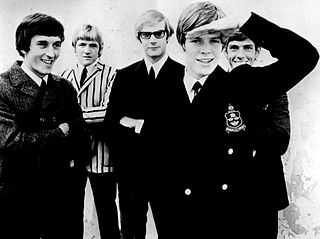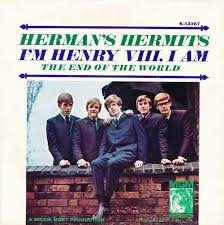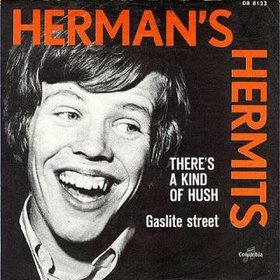Related Research Articles

Herman's Hermits are an English beat rock and pop group formed in 1964 in Manchester, originally called Herman and His Hermits and featuring lead singer Peter Noone. Produced by Mickie Most, they charted with number ones in the UK and in America, where they ranked as one of the most successful acts in the Beatles-led British Invasion. They also appeared in four films, two of them vehicles for the band.

The Hollies are a British pop rock group formed in 1962. One of the leading British groups of the 1960s and into the mid 1970s, they are known for their distinctive three-part vocal harmony style. Allan Clarke and Graham Nash founded the band as a Merseybeat-type music group in Manchester, although some of the band members came from towns further north in East Lancashire. Graham Nash left the group in 1968 to form Crosby, Stills & Nash.

Peter Blair Denis Bernard Noone is an English singer-songwriter, guitarist, pianist and actor. He is best known as "Herman" of the successful 1960s pop group Herman's Hermits.
The New Vaudeville Band was a group created by songwriter Geoff Stephens in 1966 to record his novelty composition "Winchester Cathedral", a song inspired by the dance bands of the 1920s and a Rudy Vallee megaphone-style vocal. To his surprise, the song became a transatlantic hit that autumn, reaching the Top 10 in the United Kingdom and rising to No. 1 in the United States. Initially a studio group composed of session players, Stephens quickly assembled a permanent group to continue recording and to play live shows. The New Vaudeville Band placed several singles in the US and UK top 40 through 1967 before dissolving. The group has been periodically revived since, without Stephens' participation.

"I'm Henery the Eighth, I Am" is a 1910 British music hall song by Fred Murray and R. P. Weston. It was a signature song of the music hall star Harry Champion.

"Bus Stop" is a song recorded and released as a single by the British rock band The Hollies in 1966. It reached No. 5 in the UK Singles Chart. It was the Hollies' first US top ten hit, reaching No. 5 on the Billboard charts in September 1966.
"Saturday's Child" is a song by American pop-rock band The Monkees, from their 1966 debut album The Monkees. The song features Micky Dolenz on lead vocals. It was written by Bread frontman David Gates. The song is an electric guitar–based rock song. It is widely regarded as one of their best album tracks, with AMG critic Matthew Greenwald saying that it has a "proto-heavy metal guitar riff" and it is "one of the more interesting curios of the early Monkees catalog". Though it was never released as a single, it has been included on several of The Monkees' greatest hits albums.
Geoffrey Stephens was an English songwriter and record producer, most prolific in the United Kingdom in the 1960s and 1970s. He wrote a long series of hit records, often in conjunction with other British songwriters including Tony Macaulay, John Carter, Roger Greenaway, Peter Callander, Barry Mason, Ken Howard, Alan Blaikley, Don Black, Mitch Murray, and Les Reed.

"There's a Kind of Hush" is a popular song written by Les Reed and Geoff Stephens. Originally recorded by Stephens' group the New Vaudeville Band in 1967 as a neo-British music hall number, this version of the track became a hit in Australia and South Africa. However, in the rest of the world, a near-simultaneous cover was a big hit for Herman's Hermits. The song was a charted hit again in 1976 for The Carpenters.

"Heartbeat" is a rockabilly song credited to Bob Montgomery and Norman Petty and originally recorded by Buddy Holly in 1958. The B-side of the single was "Well... All Right".

There's a Kind of Hush All Over the World is the fifth album released by MGM Records in the US and Canada for the band Herman's Hermits. It was released in March 1967. In the UK, There's a Kind of Hush All Over the World is the band's third album, released by EMI/Columbia in May 1967.

The Most of Herman's Hermits is the name of a greatest hits album released in the U.K. by EMI Records' budget label Music For Pleasure for Herman's Hermits in 1971. The title refers to the producer Mickie Most and was first used for The Most of The Animals in 1966. This album became the band's highest charting UK album, reaching #14.
Anthony "Tony" Hazzard is an English singer and songwriter. He has written songs for The Hollies, Manfred Mann, "Me, The Peaceful Heart" for Lulu, The Yardbirds, Herman's Hermits, Peter Noone, The Tremeloes, Gene Pitney, Richard Barnes, and Andy Williams amongst others.
Kenneth Alan James Hawker known as Ken Lewis, was an English singer, songwriter and record producer. He is considered one of the more successful songwriters of the 1960s as a result of his collaborations with John Carter. His biggest success was "Can't You Hear My Heartbeat", which was a 1965 US number 2 hit single for Herman's Hermits.

"No Milk Today" is a song that was written by Graham Gouldman and originally recorded by British pop band Herman's Hermits. It was first released as a single by the Mancunian group in the UK in October 1966 and, with the B-side "My Reservation's Been Confirmed", enjoyed chart success, peaking at No. 7 in the UK Singles Chart. Although not released as a single in the US, it was popular enough to become a moderate hit when it was released there as the B-side to "There's a Kind of Hush", reaching No. 35 in 1967. It was also a major hit in many European countries.

"Don't Go Out into the Rain " is a 1966 song. The song was written by Brill Building songsmith Kenny Young who himself made the original recording of the song – as "Don't Go Out into the Rain " – leading a session group credited as the Seagulls. This version broke in the Miami area in December 1966 and was consequently picked up for national release by Date Records failing to garner enough regional attention to reach the Billboard Hot 100.
"Listen People" is a song written by Graham Gouldman and performed by Herman's Hermits. The theme is based on the traditional hymn "Jesus Let Us Come to Know You." It reached #1 in Canada, #3 on both the Billboard Hot 100 and Australian charts, and #7 on both the New Zealand and Swedish charts in 1966. It was featured on their 1966 album, Volume 2: The Best of Herman's Hermits.
Into Something Good: The Mickie Most Years 1964–1972 is a 4-CD box set by British pop group Herman's Hermits, released 2008 on EMI.
The Best of Herman's Hermits: The 50th Anniversary Anthology is a 2-CD set by British group Herman's Hermits, released in 2015 on Bear Family Records. The set was produced and compiled by Grammy-nominated producer Ron Furmanek and includes the band's greatest hits along with demos, stereo mixes and session outtakes.

"Getting Over You" is a song written by Tony Hazzard in 1973, and recorded by various artists, including the writer. Hazzard's original is from his LP 'Was That Alright Then?' and was included on his double album 'Go North - The Bronze Anthology'.
References
- ↑ Herman's Hermits, "You Won't Be Leaving" Chart Positions Retrieved January 7, 2015
- ↑ Herman's Hermits, There's a Kind of Hush All Over the World Retrieved January 7, 2015
- ↑ Herman's Hermits, "Listen People" single release Retrieved January 7, 2015
- ↑ Herman's Hermits, "You Won't Be Leaving" single release Retrieved January 7, 2015
- ↑ Tony Hazzard, Tony Hazzard Sings Tony Hazzard Retrieved January 7, 2015